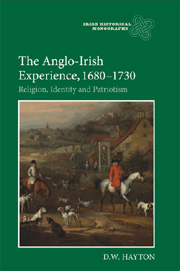Book contents
- Frontmatter
- Contents
- List of Illustrations
- Acknowledgments
- Abbreviations
- Preface
- Note on dates and quotations
- 1 From barbarian to burlesque: the changing stereotype of the Irish
- 2 Anglo-Irish attitudes: shifting perceptions of national identity
- 3 Aristocratic decline: the fall of the house of Ormond
- 4 A presence in the country: the Brodricks and their ‘interest’
- 5 ‘Commonwealthman’, unionist and king's servant: Henry Maxwell and the Whig imperative
- 6 ‘Paltry underlings of state’? The character and aspirations of the ‘Castle’ party, 1715–32
- 7 Creating industrious Protestants: charity schools and the enterprise of religious and social reformation
- 8 A question of upbringing: Thomas Prior, Sir John Rawdon, 3rd Bt, and the mentality and ideology of ‘improvement’
- Bibliography of secondary works
- Index
2 - Anglo-Irish attitudes: shifting perceptions of national identity
Published online by Cambridge University Press: 05 February 2013
- Frontmatter
- Contents
- List of Illustrations
- Acknowledgments
- Abbreviations
- Preface
- Note on dates and quotations
- 1 From barbarian to burlesque: the changing stereotype of the Irish
- 2 Anglo-Irish attitudes: shifting perceptions of national identity
- 3 Aristocratic decline: the fall of the house of Ormond
- 4 A presence in the country: the Brodricks and their ‘interest’
- 5 ‘Commonwealthman’, unionist and king's servant: Henry Maxwell and the Whig imperative
- 6 ‘Paltry underlings of state’? The character and aspirations of the ‘Castle’ party, 1715–32
- 7 Creating industrious Protestants: charity schools and the enterprise of religious and social reformation
- 8 A question of upbringing: Thomas Prior, Sir John Rawdon, 3rd Bt, and the mentality and ideology of ‘improvement’
- Bibliography of secondary works
- Index
Summary
In eighteenth-century Europe units of government tended to be ‘composite states’ rather than ‘nation states’, and political loyalties were often correspondingly local or dynastic. Thus where ‘national identity’ existed it was not necessarily ‘national’ in the modern sense of being ethnocentric and exclusive. In this political world splintered or overlapping identities were commonplace. The position of the Protestant elite of early eighteenth-century Ireland – caught between dependence on the English connexion, and dependence on Irish property – was not therefore unusual. It was, however, unusually delicate. These dual loyalties, though sometimes complementary, could pull in different directions. When English and Irish interests were in active opposition, public figures (and, indeed, private commentators) could not continue to be simultaneously ‘English’ and ‘Irish’ but were obliged to make a choice. Alternatively, the ‘Anglo-Irish’ might find themselves in a no man's land between two ‘nations’; neither properly English, nor truly and entirely Irish. Even those who asserted allegiance to Irish interests most strongly and vociferously, the self-conscious ‘patriots’ among the political classes – especially those in opposition to government – could suffer self-doubt, since their national identity was to some degree compromised by the narrow confessional basis of their politics.
As Toby Barnard has observed, in a subtle analysis of the ‘crises of identity’ besetting Irish Protestants in the Restoration period, discussion of the Anglo-Irish predicament has been plagued by conceptual confusion, as historians have failed to distinguish between ‘identity’, ‘mentality’ and ‘ideology’.
- Type
- Chapter
- Information
- The Anglo-Irish Experience, 1680-1730Religion, Identity and Patriotism, pp. 25 - 48Publisher: Boydell & BrewerPrint publication year: 2012



